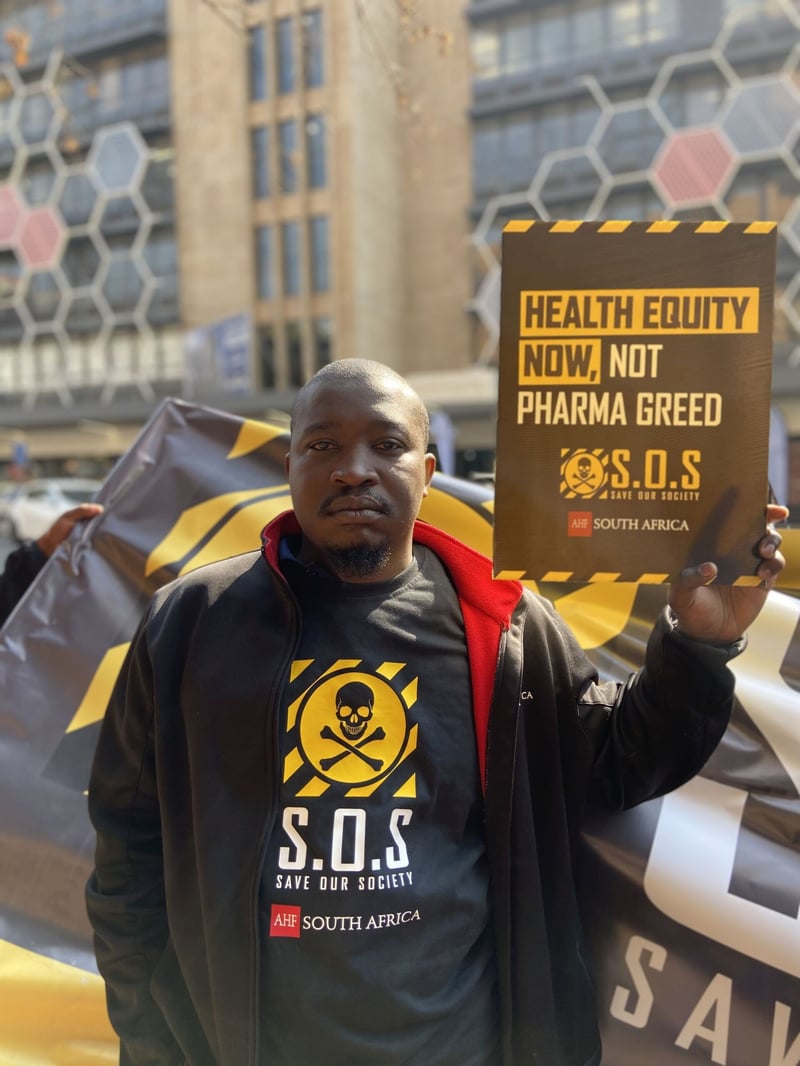AHF Urges Global South to Lead the Call for Health Equity in Pandemic Agreement
Written by: Tyler Oliver Save to Instapaper
16 September 2024 – The AIDS Healthcare Foundation (AHF) Africa has called on South Africa and other Global South nations to unite in demanding binding commitments during the ongoing World Health Organization (WHO) Pandemic Agreement negotiations. Speaking during a virtual press conference as part of the Save Our Society (SOS) campaign, AHF leaders emphasised the need for technology transfer and regional production mechanisms to ensure developing nations are better equipped for future pandemics.
Guillermina Alaniz, AHF’s Director of Global Advocacy and Policy, stressed the importance of action over rhetoric:"It is not enough to talk about equity. We must take concrete steps to achieve it. A regional production mechanism for vaccines, diagnostics, and therapeutics is vital for ensuring that countries in the Global South are not left dependent on wealthier nations in times of crisis."
Inequities Exposed by the COVID-19 Pandemic
The COVID-19 pandemic exposed deep inequalities in the global health system, where many low- and middle-income countries were the last to receive vaccines, despite promises of solidarity. While wealthy nations secured doses early on, the Global South struggled, leading to an estimated 1.3 million preventable deaths due to delayed vaccine access.
Currently, the WHO Pandemic Agreement proposes that only 20% of pandemic-related health products—such as vaccines, diagnostics, and treatments—be allocated to 80% of the world’s population, further perpetuating the disparities seen during COVID-19. This imbalance underscores the urgent need for a reworked agreement that ensures equitable access to life-saving resources.
The Role of South Africa and the Global South
South Africa, with its advanced pharmaceutical manufacturing capabilities, is well-positioned to advocate for binding commitments in the Pandemic Agreement. AHF urges the inclusion of technology transfer (Article 11) and Pathogen Access and Benefit Sharing (Article 12) provisions to ensure equitable technology sharing for production within the Global South.
Dr Samuel Kinyanjui, AHF Kenya's Country Program Director, highlighted the importance of preparedness, stating:"One of the key factors that weaken us is arriving late to the table, often without the necessary legal and economic expertise. To strengthen our position, we need to be more organised, involve civil society, and present a united front."
A Call for Accountability
The AHF campaign emphasises the need for a unified voice from the Global South to push for a binding framework that ensures equitable access to health technologies. Dr Penninah Lutung, AHF's Africa Bureau Chief, said:"The Pandemic Agreement is a chance for leaders to prioritise lives over profits. It is time to create a binding framework that ensures equitable access to health technologies for all nations, not just the wealthiest."
Speakers criticised high-income countries for advocating non-binding agreements that leave developing nations behind. Aggrey Aluso, Africa Director of the Pandemic Action Network, urged for a shift away from philanthropy-based global health financing:"Philanthropy is discretionary and cannot be the foundation of global health equity. We need robust, accountable financing mechanisms that ensure developing nations can respond effectively to future pandemics."
Strengthening African Health Systems
The conference stressed the need for African nations to prepare for future pandemics, calling for stronger regional health systems and improved research and development capabilities. AHF and its partners encouraged the South African government to lead efforts that ensure equitable access to life-saving treatments and support regional health systems.
As the WHO Pandemic Agreement negotiations continue, AHF calls for a global health system where African countries are equipped to protect their populations independently, rather than relying on wealthier nations.
Total Words: 561
Get new press articles by email
Latest from
- South Africa’s Energy Future Takes Centre Stage - Electricity Expo Africa 2025 Launches
- Growing Green Minds - Eco Lessons for Young Children
- CFI Financial Launches Free Trading Seminar in Johannesburg
- AHF South Africa Marks Youth Day with Tribute to Young Leader’s Resilience
- Youth Month - The First Steps to Financial Stability Must Start Early
- The Heart Of The Home Celebrating The Power Of Motherhood In South African Culture
- The Hidden Risk To Your Business What You Need To Know About The Financial Intelligence Centre
- Benefits Of Learning Multiple Languages – A Parent’s Role In Language Development
- CFI Financial recognised at FMAS - 25 for innovation and impact in African trading
- Understanding Global Shifts and Strategic Responses for South African Traders
- CFI Launches CFI Academy to Empower Traders and Investors
- Menstrual Health Day (28 May) – Breaking the Silence, Ending the Stigma
- Making Every Moment Count - The Value of Quality Time with Children
- Making Every Moment Count - The Power of Meaningful Time with Children
- Financial Empowerment Isn’t Just for the Wealthy – CFI CEO Zihaad Israfil Shares Practical Steps for Every South African
The Pulse Latest Articles
- Education Is The Frontline Of Inequality, Business Must Show Up (December 11, 2025)
- When The Purple Profile Pictures Fade, The Real Work Begins (December 11, 2025)
- Dear Santa, Please Skip The Socks This Year (December 10, 2025)
- Brandtech+ Has 100 Global Creative Roles For South African Talent (December 9, 2025)
- The Woman Behind Bertie: Michelle’s Journey To Cape Town’s Beloved Mobile Café (December 9, 2025)
